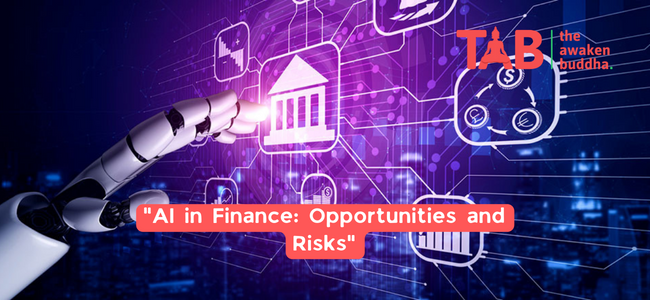Artificial Intelligence (AI) is changing the world, and the finance industry is no exception. AI is revolutionizing how financial services are delivered and offering numerous opportunities to the industry. However, like any other disruptive technology, AI also comes with its own set of risks. This article will discuss the opportunities and risks associated with AI in finance.
Opportunities
1. Enhanced Customer Experience
AI can enhance customer experience by providing personalized recommendations and insights based on customer data. This can help financial institutions better understand their customers’ needs and preferences, leading to increased customer satisfaction and loyalty.
2. Cost Reduction
AI can automate many of the manual and repetitive tasks that human beings perform in the finance industry. This can lead to significant cost reductions for financial institutions, as they can reduce their workforce and improve efficiency.
3. Fraud Detection and Prevention
AI can help financial institutions to detect and prevent fraud in real time. Machine learning algorithms can explore large volumes of data to recognize patterns and anomalies, which can help to prevent fraudulent activities.
4. Investment and Trading

AI can help financial institutions to make better investment and trading decisions by analyzing vast amounts of data and providing insights into market trends and behaviors. This can help financial institutions to maximize their returns and minimize their risks.
5. Risk Management
AI can help financial institutions to manage risks more effectively by analyzing data from multiple sources and providing real-time insights into potential risks. This can help financial institutions to make more informed decisions and reduce the likelihood of losses.
Risks
1. Data Security and Privacy
AI demands large amounts of data to function effectively. However, this data is often sensitive and confidential, which means there is a risk of data breaches and privacy violations.
2. Algorithmic Bias
AI methods are only as good as the data they are trained on. If the data is biased, the methods will also be biased, leading to discrimination and unfairness.
3. Job Losses

AI has the potential to automate many of the tasks that are performed by human beings in the finance industry. This can lead to job losses and dislocation, particularly for low-skilled workers.
4. Lack of Transparency and Accountability
AI algorithms are often complex and challenging to understand, making it difficult to hold financial institutions accountable for their decisions. This shortage of transparency can lead to distrust and a loss of confidence in the financial system.
5. Overreliance on AI
AI is a powerful tool, but it is not infallible. Overreliance on AI can lead to complacency and a failure to identify potential risks and threats.
Conclusion
AI is transforming the finance industry and offering financial institutions numerous opportunities. However, AI also comes with its own risks, which must be carefully managed. Financial institutions must ensure robust data security and privacy policies, address algorithmic bias, and manage the potential job losses that may result from AI adoption. Balancing the opportunities and risks associated with AI in finance is essential.
FAQs
1. Can AI completely replace human beings in the finance industry?
No, AI cannot completely replace human beings in the finance industry. While AI can automate many tasks, there will always be a need for human expertise and judgment.
2. How can financial institutions address algorithmic bias?
Financial institutions can address algorithmic bias by ensuring that the data used to train the algorithms is diverse and representative and by regularly monitoring and auditing the algorithms.
3. What are some of the possible benefits of AI in investment and trading?
Some potential benefits of AI in investment and trading include improved decision-making, enhanced risk management, and the ability to identify market trends and opportunities more quickly and accurately.
4. How can financial institutions confirm that they are using AI ethically?
Financial institutions can ensure that they use AI ethically by developing clear ethical guidelines and principles for AI use, being transparent about their AI systems and how they are used, and regularly reviewing and updating their AI policies and practices.
5. Will AI lead to job losses in the finance industry?
AI can automate many tasks in the finance industry, which could lead to job losses. However, AI also has the potential to create new jobs and opportunities, particularly in areas such as data analysis and machine learning. It is important for financial institutions to manage the potential job losses and dislocation that may result from AI adoption.










